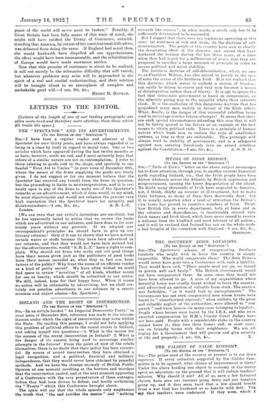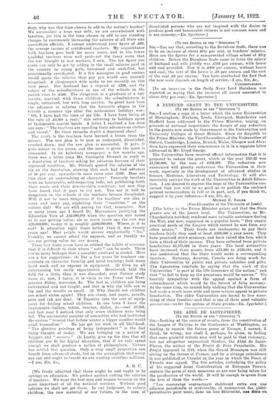THE FALSEST 01 1/4 FALSE ECONOMY.
[To THE EDITOR OF THE " SPECTATOR."]
Sra,—The prime need of the country at present is to cut down expenses. If every reduction suggested by the Geddes Com- mittee is to be opposed, what chance of improvement is there? Under the above heading you object to economy in the money spent on education, on the ground that it will reduce teachers' salaries. Why should it not? All of us, save a few favoured classes, have seen our incomes going down and our taxation going up, and it does seem hard that a few should benefit from a war that has burdened us so heavily with debt. You say that teachers were underpaid. If they were. which I deny, why was this time chosen to add to the nation's burden? We accumulate a huge war debt, we are overwhelmed with taxation, yet this is the time chosen to add to our standing charges by enormously increasing tho salaries of all State and quasi-State officials. I cannot understand your figure of £99, the average income of certificated teachers. My acquaintance with teachers goes back for many years, and in the towns qualified teachers were well paid—not the fancy sums that the war brought to war workers, I own. The low figure you quote can only be got by adding in the small salaries paid in the country to young girls, untrained and unskilled, but provisionally certificated. If a few managers in gcod centres would quote the salaries they pay you would own yourself surprised. A clergyman's wife spoke to me recently on this very point. Her husband has a stipend of 1'200, and the salary of the schoolmistress in one of the schools in the parish rises to £500. The clergyman is a graduate of a uni- versity, married, with three children; the schoolmistress is single, untrained, but with long service. So great have been the advances in salaries that the favourite slogan in the schools a summer ago after the midsummer holidays was : "Oh, I have had the time of my life. I have been living at the rate of £1,000 a year," this referring to holidays spent at fashionable seaside hotels. A letter I received a few days ago says " The teachers are spending their advances on clothes and travel." Do these remarks depict a depressed class?
The truth is the teachers have learned a lesson from the miners. The new plan is to pose as underpaid, dissatisfied, crushed down; and the new plan is successful. It pays, it puts money in the purse, and the more is given the more is demanded. In an Aylesbury newspaper, a few months ago, there was a letter from Mr. Coningahy Disraeli in reply to a deputation of teachers asking for advances because of their depressed condition. Mr. Disraeli quoted the salaries of the six on the deputation, showing that each had had advances of 50 per cent. upwards—in sonic cases over .t100. Does not this show an undermining of character? Formerly teachers were an honourable, self-respecting body, not publishing forth their needs and their downtrodden condition; but now they have found that it pays to cry out. You say it will be dangerous in the schools if the teachers become dissatisfied. Will it not be more dangerous if the teachers' one idea is more and more pay, exploiting their " condition " as the miners did? We are still paying for that, remember. Not so many years ago I heard Dr. Macnamara justifying the Education Vote of £12,000,000 when the question was raised as to our getting value; six or seven years ago the cost was £25,000,000; to-day it is roughly £100,000,000. Where is it to end? Is education eight times better than it was twenty years 'ago? Most people would answer emphatically " No." Frankly, we cannot afford the expense, and as frankly we are not getting value for our money.
These last dozen years have so relaxed the habits of economy
that it is difficult to show where " cuts " can be made. There are so many leakages that a complete overhaul is needed. Here are a few suggestions: (1) For a few years let teachers con- centrate on character forming and mind training; both mean hard work and no expense in equipment. (2) Give up all entertaining but costly experiments. Brushwork held the field for a little, then it was discarded; next Nature study came in; now, I fancy, it is visits to the Tower and West- minster Abbey, museums, &c. The fact is, children are being entertained and not taught, and that is why the bills are so big and the results so small. (3) Why should not children use school slates again? They are cheap, and paper, pencils, pens and ink are dear. (4) Examine into the cost of equip- ment for feeding school children. In one town I know the implements—boilers, tables, benches, dishes, &c.—cost £1,200, and last year I noticed that only seven children were being fed. The sentimental member of committee who had instituted the system " trusted that before winter a bigger number would avail themselves." He has got his wish in all likelihood. " The glorious privilege of being independent" is the last thing thought of to-day. We are bringing up a nation of beggars and " sooners." (5) Lastly, give up the idea that all children are fit for higher education, that if we only spend enough we shall produce a nation of philosophers. Nature has settled that question. Only a very small proportion can benefit from advanced study, but on the assumption that every one can and ought to benefit we are wasting countless millions. —I am, Sir, &c., A. B. C. [We freely admitted that there might be and ought to he savings on education. We protest against cutting the salaries of teachers. We want the best men and women to carry on the most important of all the national services. Without good salaries we shall not get them. In our judgment, to submit children, the raw material of our future, to the care of
dissatisfied persons who are not inspired with the desire td produce good and honourable citizens is not common sense and is not economy.—ED. Spectator.]



































 Previous page
Previous page